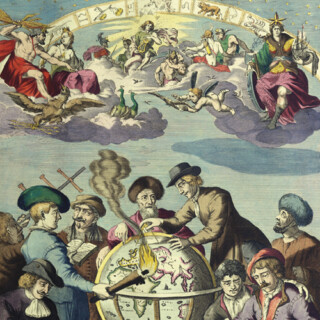Novum ac magnum theatrum urbium Belgicae.
Amsterdam,
Johannes Blaeu,
1649
Latin text, two volumes, folio atlas (545 by 355 mm), engraved title-pages with fine contemporary hand-colour and heightened in gold, 227 engraved maps (the majority double-page) with over 300 maps and views, publisher's vellum gilt, covers panelled with stylised foliate roll, and large centre and corner arabesques, with armillary sphere to centre, spine divided into eight compartments by horizontal rolls, decorated with foliate corner pieces around a central rose tool.
12570
notes:
The second Latin text edition, with very fine contemporary colouring, of Blaeu's great work on the towns of the Low Countries.
"Of all the Blaeu atlases, the townbooks of the Netherlands are held in the highest esteem in the Netherlands. This is partly due to the fact that their composition is linked up with the struggle for independence from Spain of the Dutch Republic in the seventeenth century. Bound up, by sentiment, with the most dramatic and heroic period o...
"Of all the Blaeu atlases, the townbooks of the Netherlands are held in the highest esteem in the Netherlands. This is partly due to the fact that their composition is linked up with the struggle for independence from Spain of the Dutch Republic in the seventeenth century. Bound up, by sentiment, with the most dramatic and heroic period o...
bibliography:
Koeman BL 68A and 68B; van der Krogt 43:112.
provenance:













